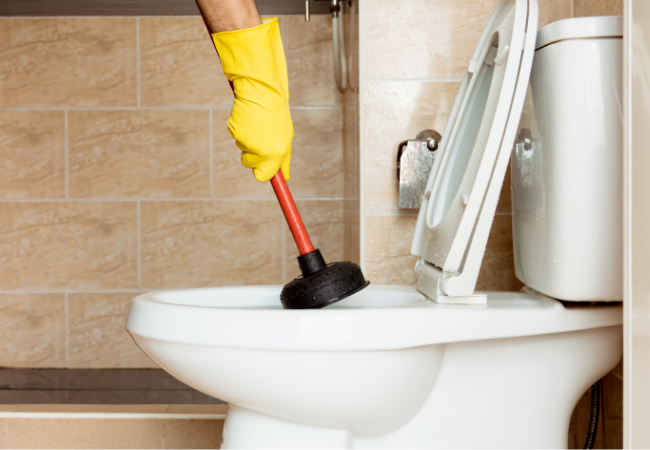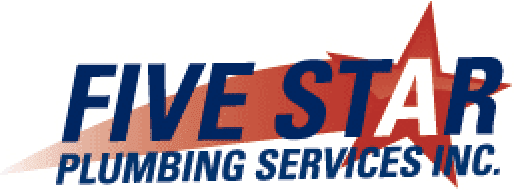Encountering a clogged toilet is an unwelcome challenge for any homeowner, presenting not only an immediate inconvenience but also the dilemma of whether it’s safe to even leave a clogged toilet overnight. For residents of Harford County, Five Star Plumbing sheds light on this common quandary. While the prospect of calling a plumber in the wee hours may seem daunting, leaving a toilet clogged overnight can potentially lead to further complications.
Although not every situation will escalate if left for a few hours, delaying repairs for an extended period, such as 5-12 hours, could increase the risk of tougher plumbing issues. In this article we will definitely answer the question: is it okay to leave a clogged toilet overnight and answer when immediate action is recommended to prevent additional issues?

Answering The Question Is It Okay To Leave a Clogged Toilet Overnight
Leaving a clogged toilet overnight carries a variety of risks that homeowners should be aware of, as it can lead to more than just a minor inconvenience.
One of the most immediate concerns is the risk of the toilet overflowing. This can happen if additional water is introduced into the system, either from a subsequent flush or from other household water usage that increases pressure on the plumbing system. An overflow is not just messy; it can also cause water damage to your flooring and potentially seep into adjacent areas, leading to costly repairs.
A clogged toilet can also become a breeding ground for bacteria and unpleasant odors if left untreated. The stagnant water in the bowl can foster the growth of harmful microorganisms, posing a health risk to your household. The presence of these bacteria, coupled with the lingering smells, can quickly turn your bathroom into an unpleasant and unsanitary space.
Another thing to keep in mind with a clogged toilet is that the longer a clog remains, the harder it may become to resolve, as waste and toilet paper can further solidify or compact, making the clog worse and more challenging to clear. This could transform what might have been a simple plunger job into a situation requiring professional plumbing tools or assistance.
Finally, a clogged toilet can just be downright annoying. A clogged and potentially overflowing toilet renders one of the most critical facilities in your home unusable. This is particularly problematic in homes with a single bathroom, as it significantly impacts the comfort and routine of all household members.
Why Do Toilets Clog in the 1st Place?
Understanding why toilets clog in the first place is crucial to preventing the issue and avoiding the risks associated with leaving a clogged toilet unattended overnight. Here at Five Star Plumbing Services, a plumber in Harford County, MD we have seen our fair share of clogged toilets. Here are a few common causes:
- Blocked Toilet Vents: Toilets require venting to maintain proper airflow, which helps to regulate the pressure inside the plumbing system and allows for smooth flushing. When these vents are blocked, typically by debris such as leaves or nests, it disrupts this balance, causing slow water flow or creating vacuums that contribute to clogs.
- Clogged Sewer Lines: The main sewer line connects your home’s plumbing to the municipal sewers or a septic tank. Issues such as tree root intrusion, pipe collapses, or a buildup of non-flushable materials can lead to clogs. When the main line is clogged, it can cause backups in all household drains, including toilets, making them prone to clogging or overflowing.
- Too Much Toilet Paper: Using excessive amounts of toilet paper is a common cause of toilet clogs. The more paper that is flushed, the more likely it is to get stuck, especially if the flushing power of the toilet is not strong enough to move it through the pipes efficiently.
- Flushing Inappropriate Items: Toilets are designed to dispose of human waste and toilet paper only. Flushing items such as wipes (even those labeled as flushable), sanitary products, cotton balls, and dental floss can easily lead to clogs because these materials do not break down in water as toilet paper does.
- A Clogged Toilet Trap: The trap is the curved section of the toilet’s internal plumbing designed to keep sewer gases from entering the home. However, this area can become clogged with excess waste or non-flushable objects. A clog in the trap can immediately affect the toilet’s flushing mechanism, making it difficult for waste and water to pass through.
How to Unclog a Toilet The Right Way
If you’ve just flushed and noticed the toilet is clogged and might overflow, act swiftly to prevent water from flooding the bathroom. Remove the tank lid promptly and push down on the flapper valve to halt water from draining out of the tank. It’s also wise to immediately shut off the water supply by turning the valve behind the toilet clockwise; this is crucial if pressing down the flapper doesn’t cease water flow into the bowl.
Lower the Water Level if the Bowl is Overfilled
In situations where the toilet bowl is brimming with water, it’s necessary to lessen the amount before attempting to dislodge the clog, preventing water from splashing onto the floor. Grab some protective long rubber gloves and utilize a small container, such as a large yogurt pot, alongside an old bucket for this task. Scoop out water with the small container and transfer it into the bucket until the toilet’s water level returns to the normal halfway mark, setting the stage to address the clog.
Eliminate the Clog with a Plunger
Employing a plunger is the most straightforward approach to resolving a toilet clog. Achieving success with this method hinges on using the right kind of plunger paired with a proper technique.
Still Need Help? Call Five Star Plumbing To Unclog Your Toilet!
Five Star Plumbing Services is locally owned and operated, and we’ve been in business since 1991. Why does that matter? Because it means owner and master plumber Chris Larichiuta and his team are local plumbers in Harford County and Baltimore County homeowners and business owners trust to get the job done right, at affordable pricing. You don’t stay in business as a plumber that long if you don’t know what you’re doing, or you charge exorbitant prices.
It also means when you call the plumber, he answers the phone, or his number one employee does. You don’t get that kind of personal attention from the big franchise companies. We’ll ask you pertinent questions to determine what the job entails. That’s what you want from a plumber. Responsiveness, honesty, and integrity. Our technician will provide you with a flat rate fee up front so you know exactly what to expect. No hidden fees. We’ll explain what we plan to do and why we plan to do it, so you know exactly what’s going on.
And we’re available to help you 7 days a week, with no overtime charges.
Areas We Serve:
Below are just a few of the places that we offer backflow testing services in Harford and Baltimore County. For any questions regarding our services please contact the office!
Aberdeen, Abingdon, Arbutus, Bel Air, Bowleys Quarters, Churchville, Cockeysville, Dundalk, Essex, Fallston, Forest Hill, Havre De Grace, Jarrettsville, Joppa Kingsville, Lutherville, Middle River, Overlea, Parkville, Perry Hall, Perryman, Pikesville, Reisterstown, Rosedale, Timonium, Towson, White Hall, and White Marsh.
